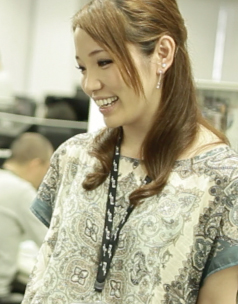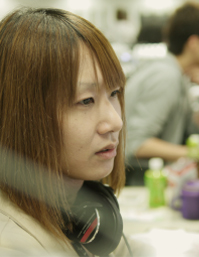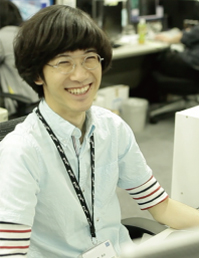Mai Ohkura (concept artist) x Eiji Funahashi (character modeler) x Misaki Shindo (sound designer)
We’d like to introduce three employees who are shouldering the next generation of game creation. Meet Ohkura, who designs characters as a concept artist, Funahashi, who models characters in 3D, and Shindo, who creates sound effects. All of them are young employees who entered the company four to six years ago, but they’ve been entrusted with key positions in their projects and have lived up to their roles. Each of them is in charge of a different aspect of game production and has a different mindset. Here, they discuss creating as part of a team and their thoughts on the future of game creation.
What making games means to us
Funahashi: I’d always liked drawing, and I remember that in around fifth grade, I was already writing in my diary that I wanted to be a character designer. Now I work as a modeler, creating characters using 3D tools and setting their shapes and textures. When I was in elementary school, I would often draw my favorite movie heroes, make up the guns or weapons they would use, and use them in my own original card game. Pokemon cards were popular at the time, but my parents wouldn’t let me buy any. So at first I started this kind of game because I was forced to, but then I learned the joy of creating a game for others. So even when I was young, I decided that this was the path I wanted to follow. That’s all I did throughout middle school, high school, and college.
 Ohkura: I work in the concept art team, where we work with the director to determine the look and feel of the game’s world. I’m mainly in charge of character design, and I draw in 2D. In my case, I was constantly doing sports when I was young, and my parents didn’t let me look at any games, manga, or anime. I was even thinking of going to a physical education university for college. But I ended up going to art school on the recommendation of my dad, who is a designer. That’s when I awakened to the joy of creating things. I entered PlatinumGames as a web designer, but I got the chance to be involved in game creation by helping out with the user interface of a game that was in production at the time. Originally my contract was supposed to be for three months, but I’ve already been here for six years (laughs). Now I’m in charge of character design, but recently I’ve been thinking that I want to do more than just draw images – I want to do anything I can to be involved in game creation. I think at the root of it, I just want to create things that the people around me can enjoy.
Ohkura: I work in the concept art team, where we work with the director to determine the look and feel of the game’s world. I’m mainly in charge of character design, and I draw in 2D. In my case, I was constantly doing sports when I was young, and my parents didn’t let me look at any games, manga, or anime. I was even thinking of going to a physical education university for college. But I ended up going to art school on the recommendation of my dad, who is a designer. That’s when I awakened to the joy of creating things. I entered PlatinumGames as a web designer, but I got the chance to be involved in game creation by helping out with the user interface of a game that was in production at the time. Originally my contract was supposed to be for three months, but I’ve already been here for six years (laughs). Now I’m in charge of character design, but recently I’ve been thinking that I want to do more than just draw images – I want to do anything I can to be involved in game creation. I think at the root of it, I just want to create things that the people around me can enjoy.
 Shindo: I used to be in a band, and I wanted to satisfy the audience that used their precious time and money to see our shows, so I could never let myself do a lukewarm performance. Now I work as a sound designer, creating sound effects for games. Just like during my band days, I want the users who buy our games to enjoy them and not to be disappointed. Reactions from customers are my biggest motivation.
Shindo: I used to be in a band, and I wanted to satisfy the audience that used their precious time and money to see our shows, so I could never let myself do a lukewarm performance. Now I work as a sound designer, creating sound effects for games. Just like during my band days, I want the users who buy our games to enjoy them and not to be disappointed. Reactions from customers are my biggest motivation.
Funahashi: What originally made you interested in creating sound?
Shindo: My body had always been small ever since I was born. To toughen me up, I had to do judo, kendo, karate, swimming, and other sports before I even entered elementary school. I continued soccer until I entered high school, but then I contracted a serious illness and had to live in a wheelchair. With surgery, I was able to return to my regular life, but I still couldn’t do the kind of exercise I had before. I anguished about what I should do next. For a change of pace, I decided to buy a synthesizer with earnings from my part-time job, and from then on, I was immersed in my band and composing music.
Ohkura: It’s hard when you have to give up something that you want to do. I had always liked drawing ever since I was little, but in middle school I almost gave up because I couldn’t draw the way I wanted. Because of that, I focused on doing physical activities, and I plunged into martial arts like karate and naginata until I entered art school.
Shindo: They may sound completely unrelated, but the passion I experienced when I was young has created my current self. The other day, when I was working really hard, I thought to myself, “how am I able to keep on going?” Then I realized that it was because of sports. The mental and physical training I experienced in soccer and judo were foundational for me. When you think of it that way, maybe perseverance is needed in creative industries like ours.
 Funahashi: Yes, being able to power through when it really counts is important. Your ability to do that affects the final quality of the game. It all depends on whether you can be persistent and create something that satisfies you under a very tight schedule. But fundamentally, it’s important that you want to create something that people enjoy.
Funahashi: Yes, being able to power through when it really counts is important. Your ability to do that affects the final quality of the game. It all depends on whether you can be persistent and create something that satisfies you under a very tight schedule. But fundamentally, it’s important that you want to create something that people enjoy.
Shindo: In my case, I used to work at a musical instrument store, and it made me happy to hear words of gratitude from customers or see their pleased reactions right in front of me. While I was working there, I began interacting with creators and artists, and they had an impact on me. I set my mind to doing something creative, and I decided to aim for the game industry, which I had always been interested in. First of all, to polish my skills, I lived on my savings and spent an entire year concentrating on composing music. A year later, I brought the work I was satisfied with and applied to PlatinumGames as a music composer. However, the bar was higher than I thought, and I didn’t get hired. After that, PG was recruiting for sound designers, so I tried again and was luckily able to enter the company.
Ohkura: Within the company, people were gossiping about you – like, “a famous composer online is joining the company!” I remember that you brought some music with you to introduce yourself.
Shindo: Come to think of it, I did (laughs). But in the beginning, I couldn’t create what was required of me as a sound designer, and I agonized for the first six months. At the time, I hoped that with any luck, I would be able to move to the music team. But when I discovered the interest of creating sound effects, I stopped having any regrets about not working as a music composer.
Ohkura: I’ve gone through a series of frustrations with myself, but I am driven by my never-give-up attitude and my wish to create things that myself and everyone around me is satisfied with, and let them out into the world for users to enjoy.
(Continues to Part 2.)
interview by editorial studio MUESUM (2012/07/20)